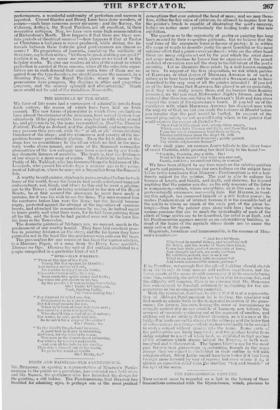THE IRISHMAN OF THE STAGE.
'WE have of late years had a succession of admirable novels from Irish writers, the scenes of which have been laid on Irish ground. The new forms of pleasantry in which these productions have placed the character of the Irishman, have served to show how villanously ill the play-wrights have supplied us with what should be, and pretends to be, the same representation. Read the Nietis!er Festival, To-day in Ireland, and the ATrlo-Irish, and compare the racy persons they present, with the " at ail, at all," dram-driehing blunderer of the stage ; and the clumsiness and poverty of the im- position become provokingly glaring. Even the Irish idiom of the stage has no resemblance to the idiom which we find in the mas- terly works above named, and none of the thousand vernacular pleasantries of the low colloquy have been seized on by our Cock- ney dramatic limners of manners. The truth is, that the Irishman of our stage is a mere copy of copies. Mr. Catchclap imitates the Paddy of Mr. Ticklepit, who has borrowed from the Irishman of Mr. Lovegods, who passed his whole days a century ago in the retire- ment of Islington, where he once saw a haymaker from the Emerald Isle.
A worthy herald-painter, stricken in years, resolved before he took leave of the world, to see the lions he had so often designed rampant and couchant, red, black, and blue : to this end he went a pilgrim- age to the Tower ; and on being conducted to the den of the Royal Beasts, he at first assured the showman he must have made a mistake, for it was his wish to see the lions. The man assured him the creatures before him were the lions : but the herald became angry, protested against the attempt at the imposition of spurious beasts, and clenched his remonstrance by saying, he indeed ought to know pretty well what lions were, for he had been painting them all his life, and the lions he had painted were not in the least like the lions in the Tower-den.
The dramatic painters of Irishmen are, we suspect, much in the predicament of our worthy herald. They have had excellent prac- tice in painting Irishmen on the stage, and the Irishman they have painted is not in the least like the gentleman who enlivens the bogs.
The provocation for our comment has been the wanton citation, in a Morning Paper, of a song from the Drury Lane spectacle, Thierna nu Oge. Observe the sort of fiat rubbish attributed to a people unequalled in a particular kind of wit !
"SONG—DAN O'REILLY.
'Twas at the sign of the Fork Young Pat first opened his throttle ; And being a native of Cork, No wonder he dipp'd in the bottle.
Ills mother's own milk, they say, Soon made him quite funny and frisky, For when she put cream in his tea, By the powers ! it was nothing but whisky. Oh ! Paddy O'Flannagan, Neat, tippling Paddy, Pat was a darling boy !
" For England he sailed one day, Determined to be a great rover, But fell overboard in the sea, When he'd been at least half-seas over ; But saved by a man was hard by,
Who show'd him a deal of goad-nature;
The water, he said, made him dry, So he ask'd for a drop of the cratur Oh ! Paddy, &c.
" To the Devil's Punch-bowl he came, A pond that in Kerry is brimming, And soon, for the sake of its name, Was seen in the Punch-bowl swimming. For whisky he wrestled and huri'd, And won all his bets by his merits ; Then drank himself out of the world, To go to the world of spirits.
Oh! Paddy, &c."
ti


















 Previous page
Previous page